Dominik Kowald
Private and Fair Machine Learning: Revisiting the Disparate Impact of Differentially Private SGD
Oct 02, 2025Abstract:Differential privacy (DP) is a prominent method for protecting information about individuals during data analysis. Training neural networks with differentially private stochastic gradient descent (DPSGD) influences the model's learning dynamics and, consequently, its output. This can affect the model's performance and fairness. While the majority of studies on the topic report a negative impact on fairness, it has recently been suggested that fairness levels comparable to non-private models can be achieved by optimizing hyperparameters for performance directly on differentially private models (rather than re-using hyperparameters from non-private models, as is common practice). In this work, we analyze the generalizability of this claim by 1) comparing the disparate impact of DPSGD on different performance metrics, and 2) analyzing it over a wide range of hyperparameter settings. We highlight that a disparate impact on one metric does not necessarily imply a disparate impact on another. Most importantly, we show that while optimizing hyperparameters directly on differentially private models does not mitigate the disparate impact of DPSGD reliably, it can still lead to improved utility-fairness trade-offs compared to re-using hyperparameters from non-private models. We stress, however, that any form of hyperparameter tuning entails additional privacy leakage, calling for careful considerations of how to balance privacy, utility and fairness. Finally, we extend our analyses to DPSGD-Global-Adapt, a variant of DPSGD designed to mitigate the disparate impact on accuracy, and conclude that this alternative may not be a robust solution with respect to hyperparameter choice.
Impacts of Mainstream-Driven Algorithms on Recommendations for Children Across Domains: A Reproducibility Study
Jul 09, 2025


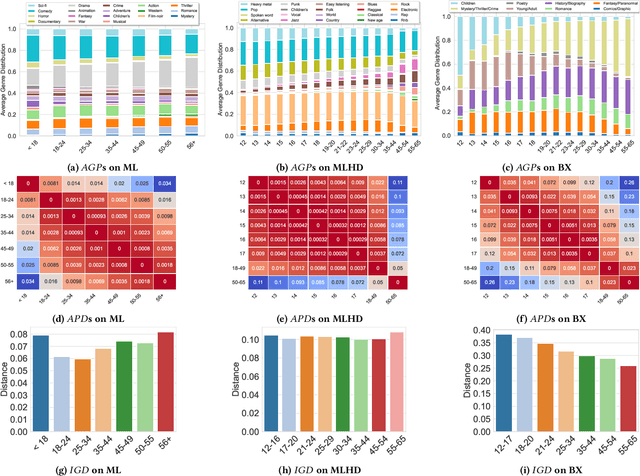
Abstract:Children are often exposed to items curated by recommendation algorithms. Yet, research seldom considers children as a user group, and when it does, it is anchored on datasets where children are underrepresented, risking overlooking their interests, favoring those of the majority, i.e., mainstream users. Recently, Ungruh et al. demonstrated that children's consumption patterns and preferences differ from those of mainstream users, resulting in inconsistent recommendation algorithm performance and behavior for this user group. These findings, however, are based on two datasets with a limited child user sample. We reproduce and replicate this study on a wider range of datasets in the movie, music, and book domains, uncovering interaction patterns and aspects of child-recommender interactions consistent across domains, as well as those specific to some user samples in the data. We also extend insights from the original study with popularity bias metrics, given the interpretation of results from the original study. With this reproduction and extension, we uncover consumption patterns and differences between age groups stemming from intrinsic differences between children and others, and those unique to specific datasets or domains.
Hybrid Personalization Using Declarative and Procedural Memory Modules of the Cognitive Architecture ACT-R
May 08, 2025Abstract:Recommender systems often rely on sub-symbolic machine learning approaches that operate as opaque black boxes. These approaches typically fail to account for the cognitive processes that shape user preferences and decision-making. In this vision paper, we propose a hybrid user modeling framework based on the cognitive architecture ACT-R that integrates symbolic and sub-symbolic representations of human memory. Our goal is to combine ACT-R's declarative memory, which is responsible for storing symbolic chunks along sub-symbolic activations, with its procedural memory, which contains symbolic production rules. This integration will help simulate how users retrieve past experiences and apply decision-making strategies. With this approach, we aim to provide more transparent recommendations, enable rule-based explanations, and facilitate the modeling of cognitive biases. We argue that our approach has the potential to inform the design of a new generation of human-centered, psychology-informed recommender systems.
Investigating Popularity Bias Amplification in Recommender Systems Employed in the Entertainment Domain
Apr 07, 2025
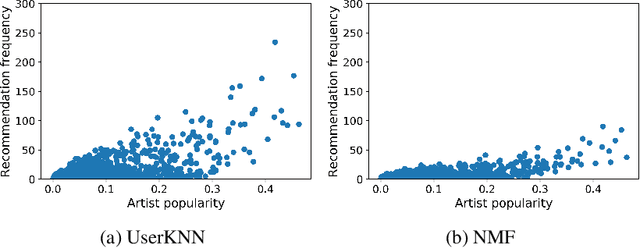
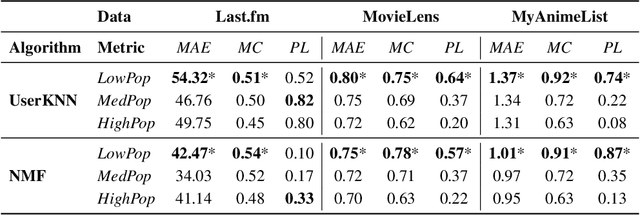
Abstract:Recommender systems have become an integral part of our daily online experience by analyzing past user behavior to suggest relevant content in entertainment domains such as music, movies, and books. Today, they are among the most widely used applications of AI and machine learning. Consequently, regulations and guidelines for trustworthy AI, such as the European AI Act, which addresses issues like bias and fairness, are highly relevant to the design, development, and evaluation of recommender systems. One particularly important type of bias in this context is popularity bias, which results in the unfair underrepresentation of less popular content in recommendation lists. This work summarizes our research on investigating the amplification of popularity bias in recommender systems within the entertainment sector. Analyzing datasets from three entertainment domains, music, movies, and anime, we demonstrate that an item's recommendation frequency is positively correlated with its popularity. As a result, user groups with little interest in popular content receive less accurate recommendations compared to those who prefer widely popular items. Furthermore, we aim to better understand the connection between recommendation accuracy, calibration quality of algorithms, and popularity bias amplification.
De-centering the (Traditional) User: Multistakeholder Evaluation of Recommender Systems
Jan 09, 2025Abstract:Multistakeholder recommender systems are those that account for the impacts and preferences of multiple groups of individuals, not just the end users receiving recommendations. Due to their complexity, evaluating these systems cannot be restricted to the overall utility of a single stakeholder, as is often the case of more mainstream recommender system applications. In this article, we focus our discussion on the intricacies of the evaluation of multistakeholder recommender systems. We bring attention to the different aspects involved in the evaluation of multistakeholder recommender systems - from the range of stakeholders involved (including but not limited to producers and consumers) to the values and specific goals of each relevant stakeholder. Additionally, we discuss how to move from theoretical principles to practical implementation, providing specific use case examples. Finally, we outline open research directions for the RecSys community to explore. We aim to provide guidance to researchers and practitioners about how to think about these complex and domain-dependent issues of evaluation in the course of designing, developing, and researching applications with multistakeholder aspects.
Establishing and Evaluating Trustworthy AI: Overview and Research Challenges
Nov 15, 2024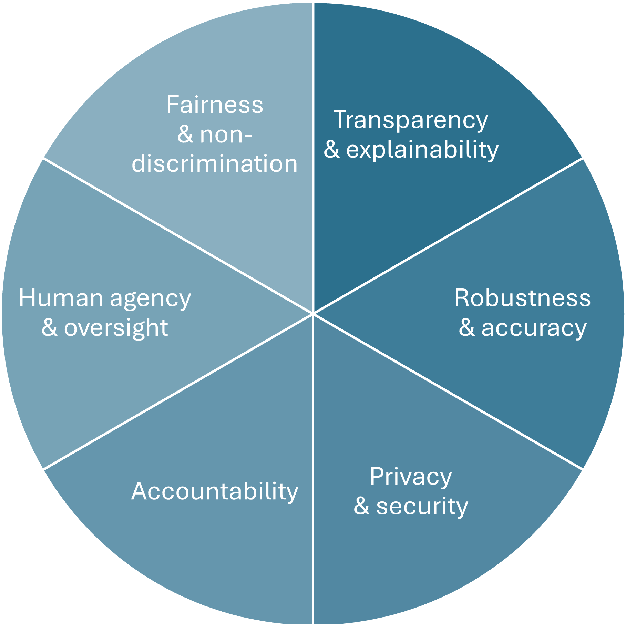

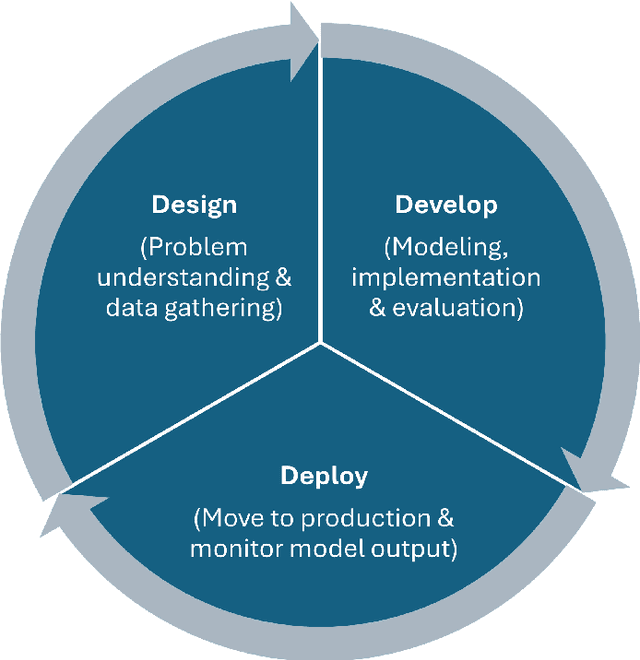
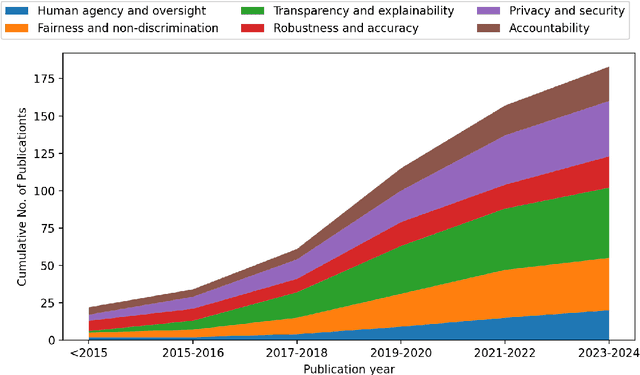
Abstract:Artificial intelligence (AI) technologies (re-)shape modern life, driving innovation in a wide range of sectors. However, some AI systems have yielded unexpected or undesirable outcomes or have been used in questionable manners. As a result, there has been a surge in public and academic discussions about aspects that AI systems must fulfill to be considered trustworthy. In this paper, we synthesize existing conceptualizations of trustworthy AI along six requirements: 1) human agency and oversight, 2) fairness and non-discrimination, 3) transparency and explainability, 4) robustness and accuracy, 5) privacy and security, and 6) accountability. For each one, we provide a definition, describe how it can be established and evaluated, and discuss requirement-specific research challenges. Finally, we conclude this analysis by identifying overarching research challenges across the requirements with respect to 1) interdisciplinary research, 2) conceptual clarity, 3) context-dependency, 4) dynamics in evolving systems, and 5) investigations in real-world contexts. Thus, this paper synthesizes and consolidates a wide-ranging and active discussion currently taking place in various academic sub-communities and public forums. It aims to serve as a reference for a broad audience and as a basis for future research directions.
Challenges in Implementing a Recommender System for Historical Research in the Humanities
Oct 28, 2024
Abstract:This extended abstract describes the challenges in implementing recommender systems for digital archives in the humanities, focusing on Monasterium.net, a platform for historical legal documents. We discuss three key aspects: (i) the unique characteristics of so-called charters as items for recommendation, (ii) the complex multi-stakeholder environment, and (iii) the distinct information-seeking behavior of scholars in the humanities. By examining these factors, we aim to contribute to the development of more effective and tailored recommender systems for (digital) humanities research.
Value Identification in Multistakeholder Recommender Systems for Humanities and Historical Research: The Case of the Digital Archive Monasterium.net
Sep 26, 2024Abstract:Recommender systems remain underutilized in humanities and historical research, despite their potential to enhance the discovery of cultural records. This paper offers an initial value identification of the multiple stakeholders that might be impacted by recommendations in Monasterium.net, a digital archive for historical legal documents. Specifically, we discuss the diverse values and objectives of its stakeholders, such as editors, aggregators, platform owners, researchers, publishers, and funding agencies. These in-depth insights into the potentially conflicting values of stakeholder groups allow designing and adapting recommender systems to enhance their usefulness for humanities and historical research. Additionally, our findings will support deeper engagement with additional stakeholders to refine value models and evaluation metrics for recommender systems in the given domains. Our conclusions are embedded in and applicable to other digital archives and a broader cultural heritage context.
Oh, Behave! Country Representation Dynamics Created by Feedback Loops in Music Recommender Systems
Aug 21, 2024



Abstract:Recent work suggests that music recommender systems are prone to disproportionally frequent recommendations of music from countries more prominently represented in the training data, notably the US. However, it remains unclear to what extent feedback loops in music recommendation influence the dynamics of such imbalance. In this work, we investigate the dynamics of representation of local (i.e., country-specific) and US-produced music in user profiles and recommendations. To this end, we conduct a feedback loop simulation study using the standardized LFM-2b dataset. The results suggest that most of the investigated recommendation models decrease the proportion of music from local artists in their recommendations. Furthermore, we find that models preserving average proportions of US and local music do not necessarily provide country-calibrated recommendations. We also look into popularity calibration and, surprisingly, find that the most popularity-calibrated model in our study (ItemKNN) provides the least country-calibrated recommendations. In addition, users from less represented countries (e.g., Finland) are, in the long term, most affected by the under-representation of their local music in recommendations.
AI-Powered Immersive Assistance for Interactive Task Execution in Industrial Environments
Jul 12, 2024Abstract:Many industrial sectors rely on well-trained employees that are able to operate complex machinery. In this work, we demonstrate an AI-powered immersive assistance system that supports users in performing complex tasks in industrial environments. Specifically, our system leverages a VR environment that resembles a juice mixer setup. This digital twin of a physical setup simulates complex industrial machinery used to mix preparations or liquids (e.g., similar to the pharmaceutical industry) and includes various containers, sensors, pumps, and flow controllers. This setup demonstrates our system's capabilities in a controlled environment while acting as a proof-of-concept for broader industrial applications. The core components of our multimodal AI assistant are a large language model and a speech-to-text model that process a video and audio recording of an expert performing the task in a VR environment. The video and speech input extracted from the expert's video enables it to provide step-by-step guidance to support users in executing complex tasks. This demonstration showcases the potential of our AI-powered assistant to reduce cognitive load, increase productivity, and enhance safety in industrial environments.
 Add to Chrome
Add to Chrome Add to Firefox
Add to Firefox Add to Edge
Add to Edge